A Comprehensive Report on Leadership Theories, Traits, and Benefits
VerifiedAdded on 2023/06/11
|11
|1090
|348
Report
AI Summary
This report provides a comprehensive overview of leadership, focusing on various leadership theories such as Great Man, Trait, Contingency, Behavioral, Participative, Management, and Relationship theories. It discusses essential traits of effective leaders, including communication, focus, kindness, self-awareness, and innovation, highlighting how these traits can be developed. Furthermore, the report outlines the benefits of strong leadership in organizations, emphasizing its role in motivating employees and achieving organizational goals. In conclusion, the report underscores the importance of leadership in driving organizational success and provides references for further reading on the subject. Desklib is a valuable resource for students seeking solved assignments and study materials.

Leadership
Paraphrase This Document
Need a fresh take? Get an instant paraphrase of this document with our AI Paraphraser
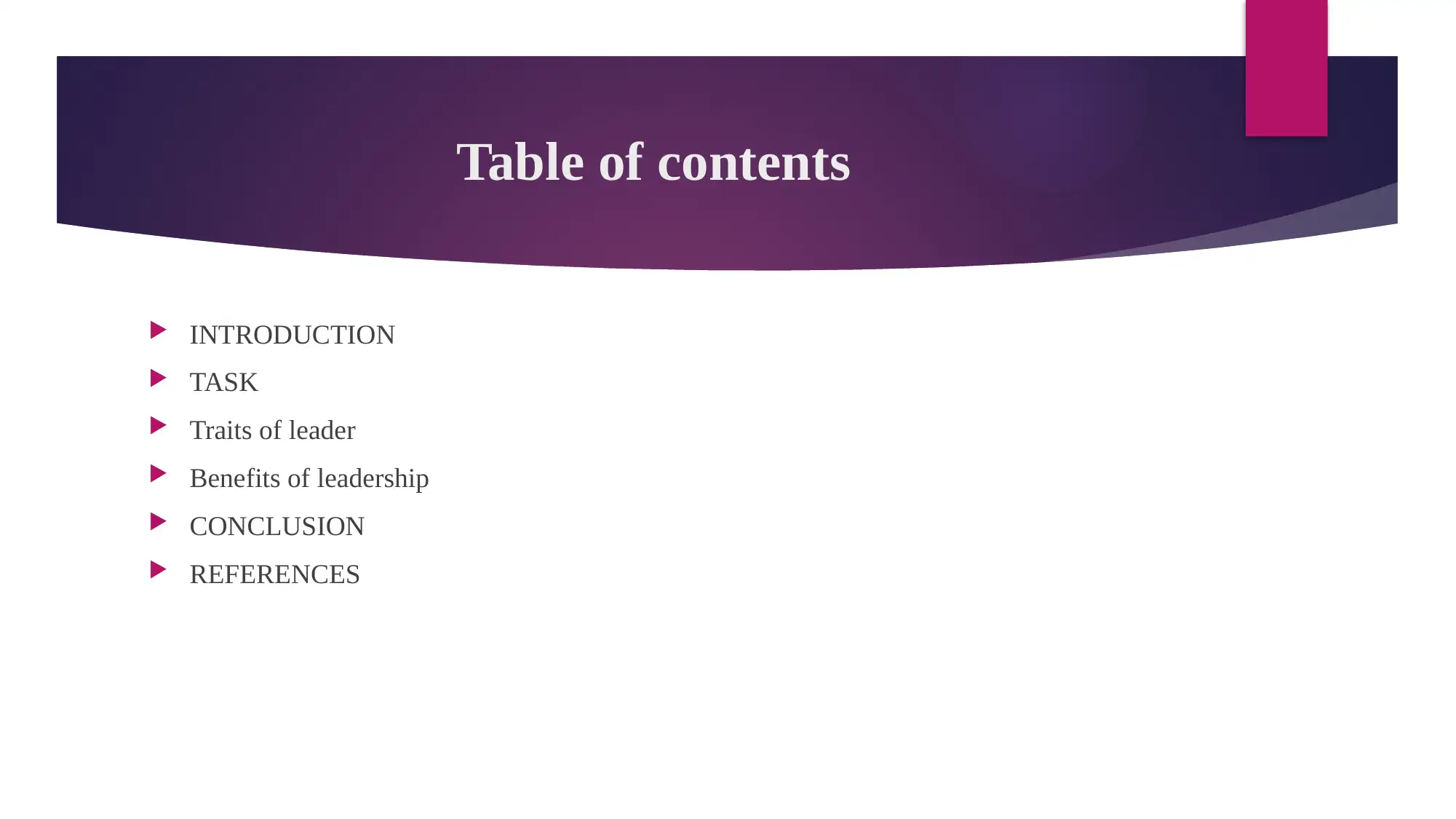
Table of contents
INTRODUCTION
TASK
Traits of leader
Benefits of leadership
CONCLUSION
REFERENCES
INTRODUCTION
TASK
Traits of leader
Benefits of leadership
CONCLUSION
REFERENCES
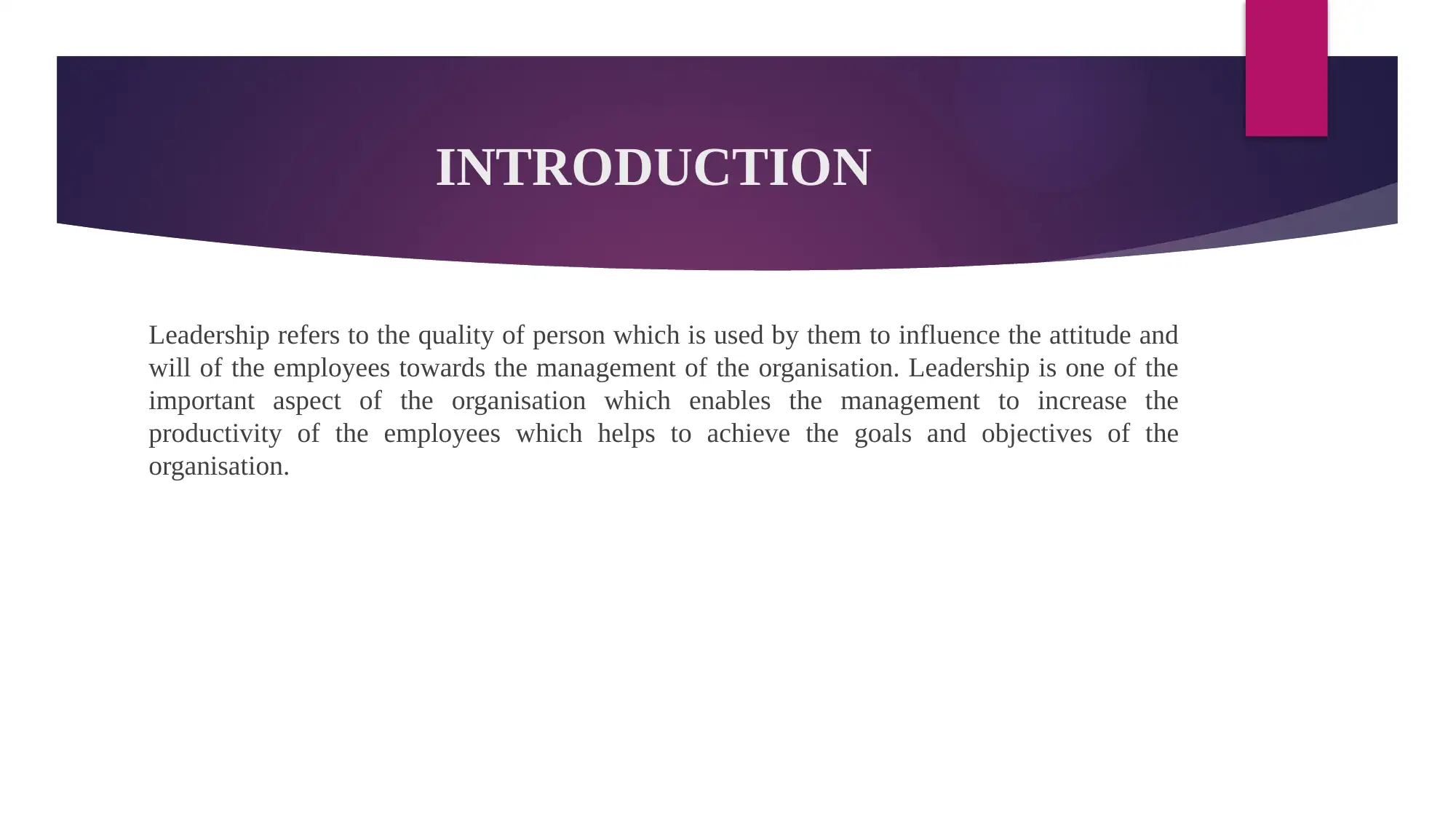
INTRODUCTION
Leadership refers to the quality of person which is used by them to influence the attitude and
will of the employees towards the management of the organisation. Leadership is one of the
important aspect of the organisation which enables the management to increase the
productivity of the employees which helps to achieve the goals and objectives of the
organisation.
Leadership refers to the quality of person which is used by them to influence the attitude and
will of the employees towards the management of the organisation. Leadership is one of the
important aspect of the organisation which enables the management to increase the
productivity of the employees which helps to achieve the goals and objectives of the
organisation.
⊘ This is a preview!⊘
Do you want full access?
Subscribe today to unlock all pages.

Trusted by 1+ million students worldwide
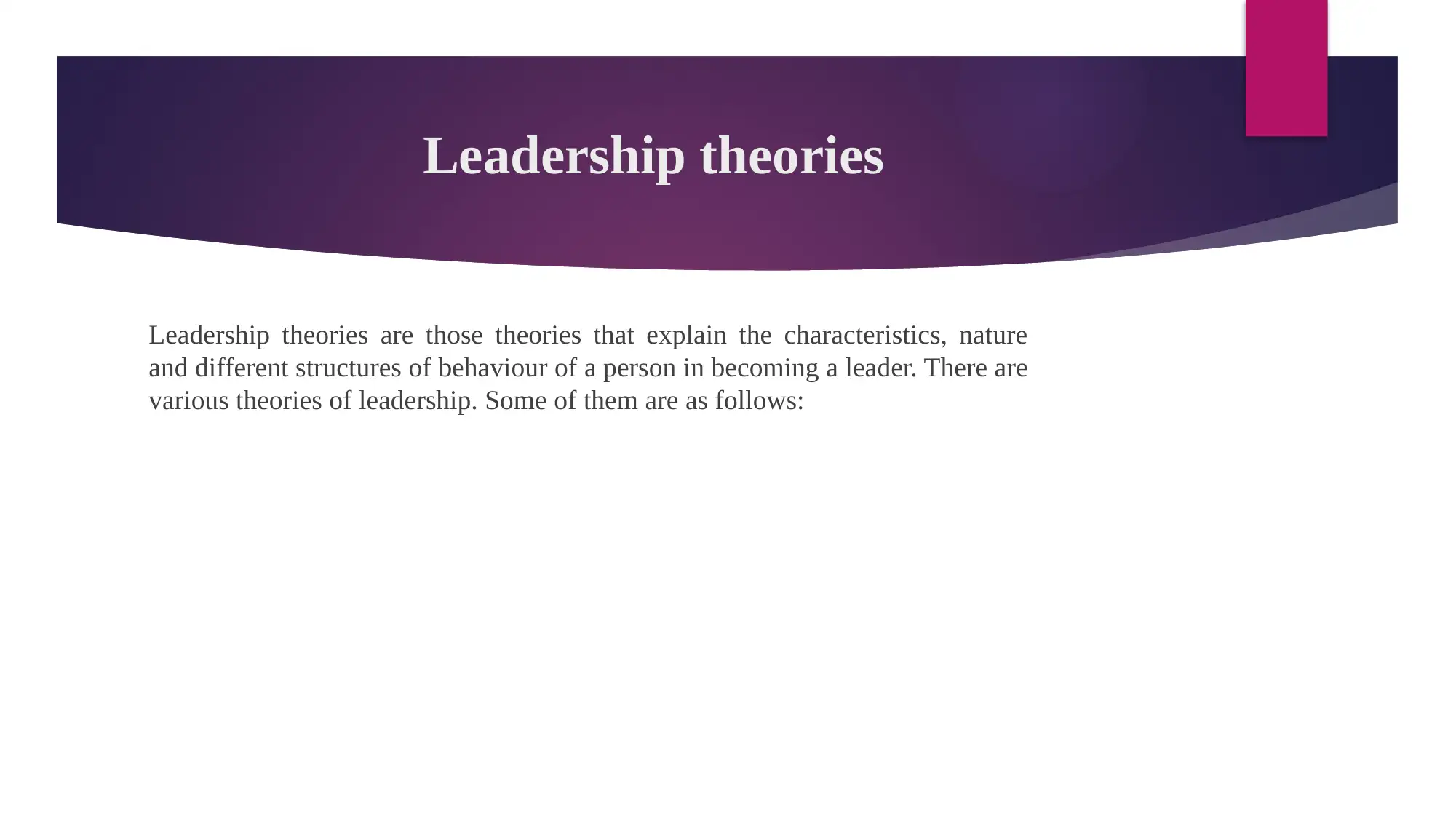
Leadership theories
Leadership theories are those theories that explain the characteristics, nature
and different structures of behaviour of a person in becoming a leader. There are
various theories of leadership. Some of them are as follows:
Leadership theories are those theories that explain the characteristics, nature
and different structures of behaviour of a person in becoming a leader. There are
various theories of leadership. Some of them are as follows:
Paraphrase This Document
Need a fresh take? Get an instant paraphrase of this document with our AI Paraphraser
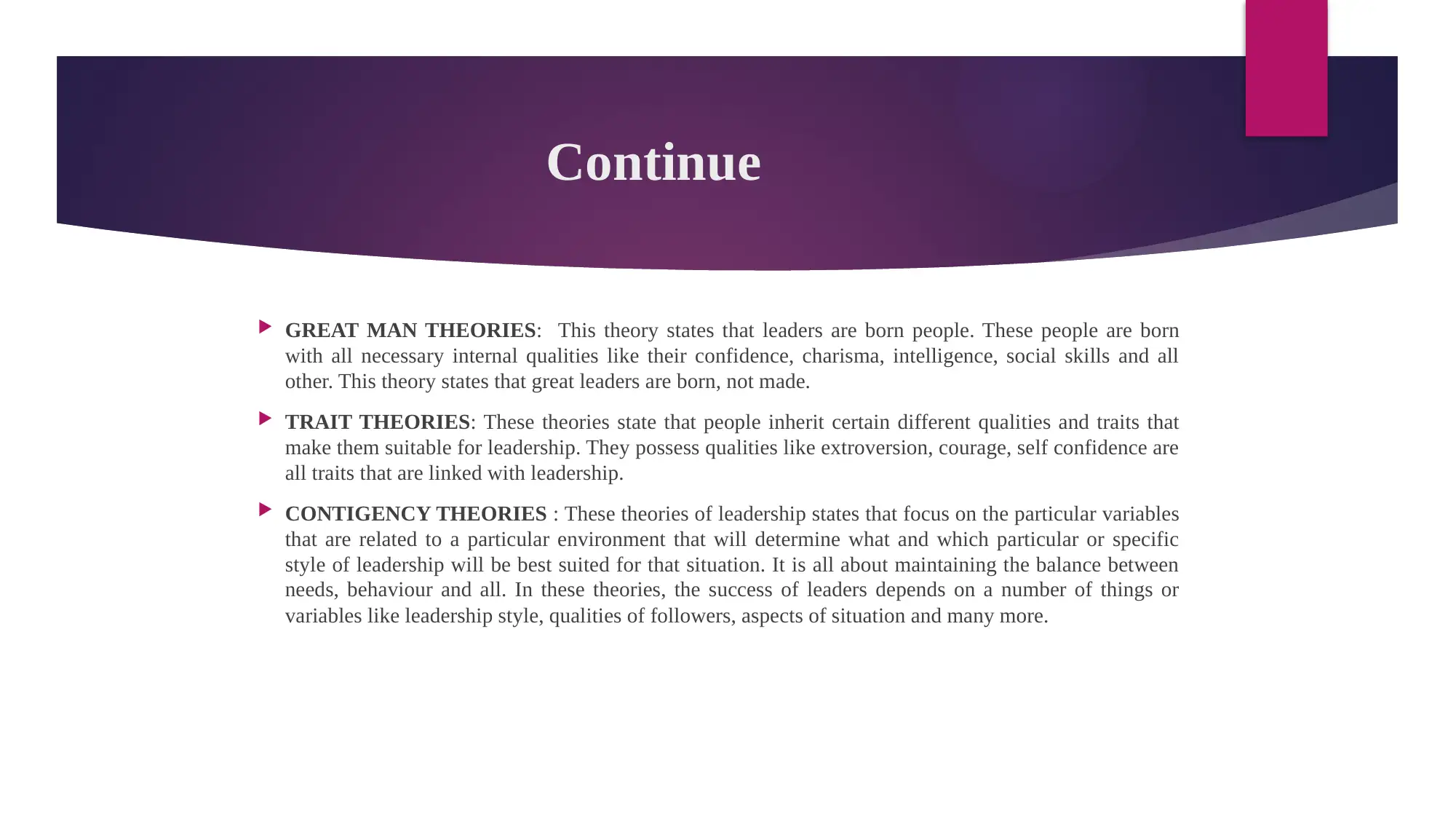
Continue
GREAT MAN THEORIES: This theory states that leaders are born people. These people are born
with all necessary internal qualities like their confidence, charisma, intelligence, social skills and all
other. This theory states that great leaders are born, not made.
TRAIT THEORIES: These theories state that people inherit certain different qualities and traits that
make them suitable for leadership. They possess qualities like extroversion, courage, self confidence are
all traits that are linked with leadership.
CONTIGENCY THEORIES : These theories of leadership states that focus on the particular variables
that are related to a particular environment that will determine what and which particular or specific
style of leadership will be best suited for that situation. It is all about maintaining the balance between
needs, behaviour and all. In these theories, the success of leaders depends on a number of things or
variables like leadership style, qualities of followers, aspects of situation and many more.
GREAT MAN THEORIES: This theory states that leaders are born people. These people are born
with all necessary internal qualities like their confidence, charisma, intelligence, social skills and all
other. This theory states that great leaders are born, not made.
TRAIT THEORIES: These theories state that people inherit certain different qualities and traits that
make them suitable for leadership. They possess qualities like extroversion, courage, self confidence are
all traits that are linked with leadership.
CONTIGENCY THEORIES : These theories of leadership states that focus on the particular variables
that are related to a particular environment that will determine what and which particular or specific
style of leadership will be best suited for that situation. It is all about maintaining the balance between
needs, behaviour and all. In these theories, the success of leaders depends on a number of things or
variables like leadership style, qualities of followers, aspects of situation and many more.
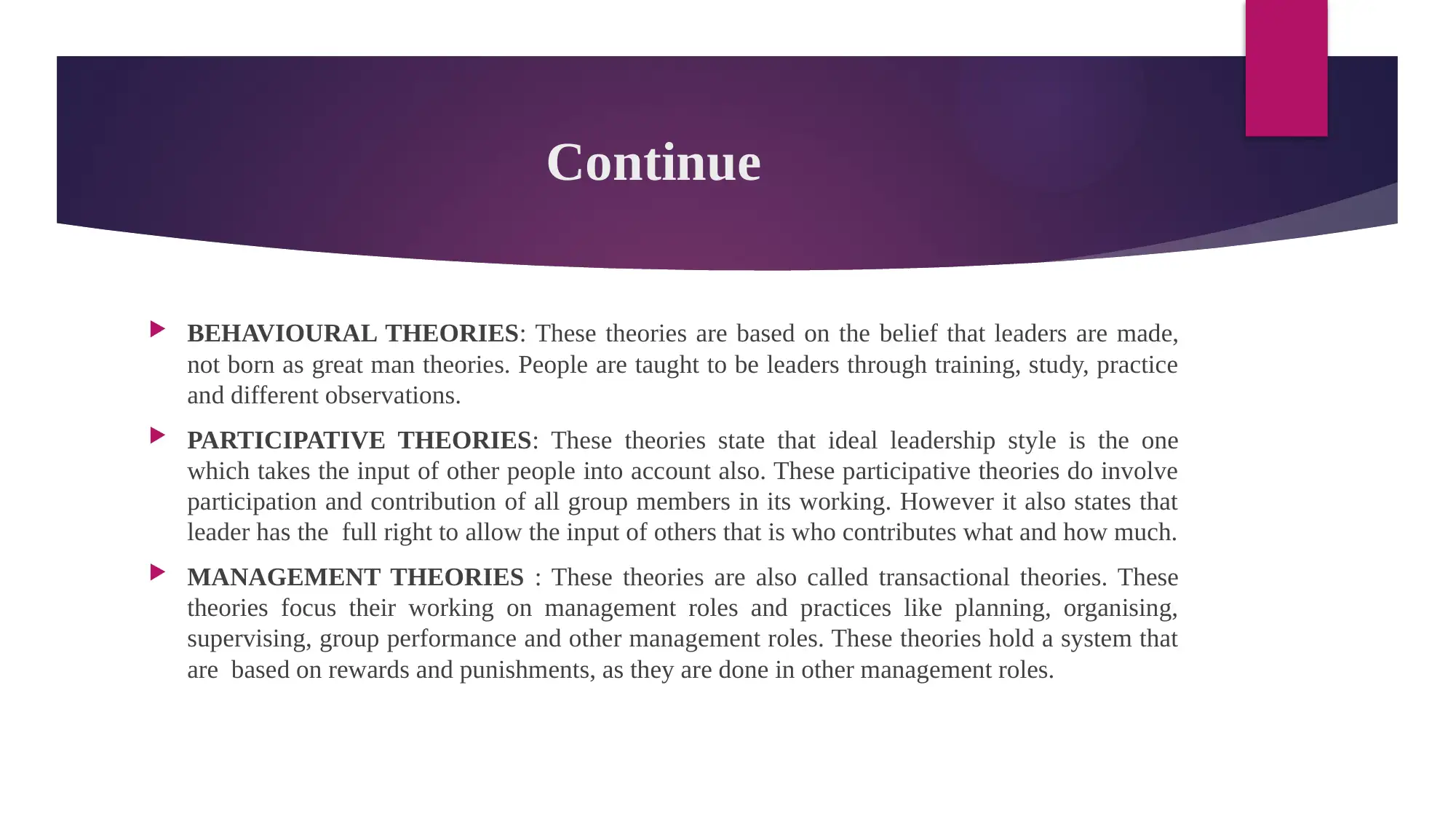
Continue
BEHAVIOURAL THEORIES: These theories are based on the belief that leaders are made,
not born as great man theories. People are taught to be leaders through training, study, practice
and different observations.
PARTICIPATIVE THEORIES: These theories state that ideal leadership style is the one
which takes the input of other people into account also. These participative theories do involve
participation and contribution of all group members in its working. However it also states that
leader has the full right to allow the input of others that is who contributes what and how much.
MANAGEMENT THEORIES : These theories are also called transactional theories. These
theories focus their working on management roles and practices like planning, organising,
supervising, group performance and other management roles. These theories hold a system that
are based on rewards and punishments, as they are done in other management roles.
BEHAVIOURAL THEORIES: These theories are based on the belief that leaders are made,
not born as great man theories. People are taught to be leaders through training, study, practice
and different observations.
PARTICIPATIVE THEORIES: These theories state that ideal leadership style is the one
which takes the input of other people into account also. These participative theories do involve
participation and contribution of all group members in its working. However it also states that
leader has the full right to allow the input of others that is who contributes what and how much.
MANAGEMENT THEORIES : These theories are also called transactional theories. These
theories focus their working on management roles and practices like planning, organising,
supervising, group performance and other management roles. These theories hold a system that
are based on rewards and punishments, as they are done in other management roles.
⊘ This is a preview!⊘
Do you want full access?
Subscribe today to unlock all pages.

Trusted by 1+ million students worldwide
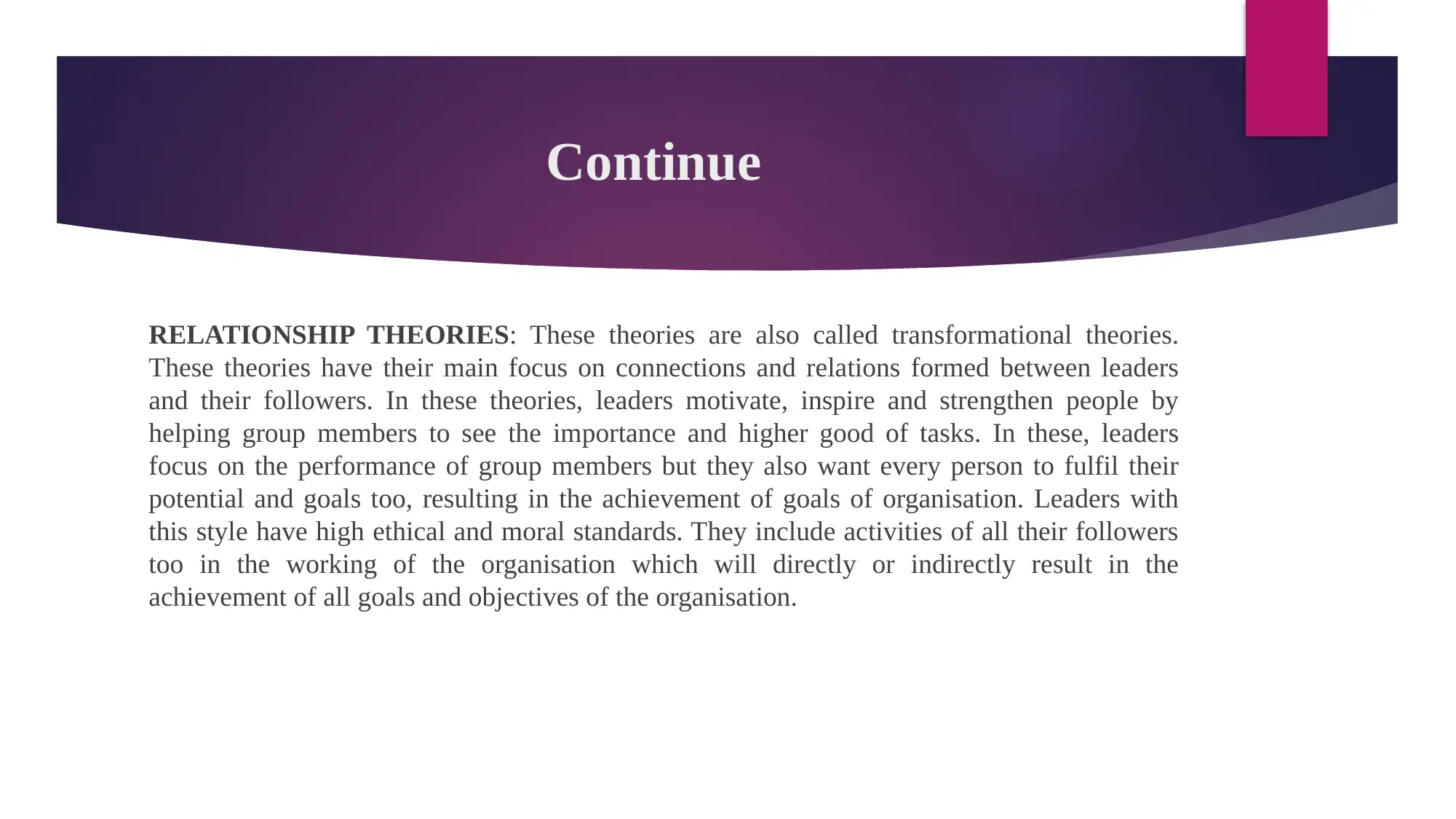
Continue
RELATIONSHIP THEORIES: These theories are also called transformational theories.
These theories have their main focus on connections and relations formed between leaders
and their followers. In these theories, leaders motivate, inspire and strengthen people by
helping group members to see the importance and higher good of tasks. In these, leaders
focus on the performance of group members but they also want every person to fulfil their
potential and goals too, resulting in the achievement of goals of organisation. Leaders with
this style have high ethical and moral standards. They include activities of all their followers
too in the working of the organisation which will directly or indirectly result in the
achievement of all goals and objectives of the organisation.
RELATIONSHIP THEORIES: These theories are also called transformational theories.
These theories have their main focus on connections and relations formed between leaders
and their followers. In these theories, leaders motivate, inspire and strengthen people by
helping group members to see the importance and higher good of tasks. In these, leaders
focus on the performance of group members but they also want every person to fulfil their
potential and goals too, resulting in the achievement of goals of organisation. Leaders with
this style have high ethical and moral standards. They include activities of all their followers
too in the working of the organisation which will directly or indirectly result in the
achievement of all goals and objectives of the organisation.
Paraphrase This Document
Need a fresh take? Get an instant paraphrase of this document with our AI Paraphraser
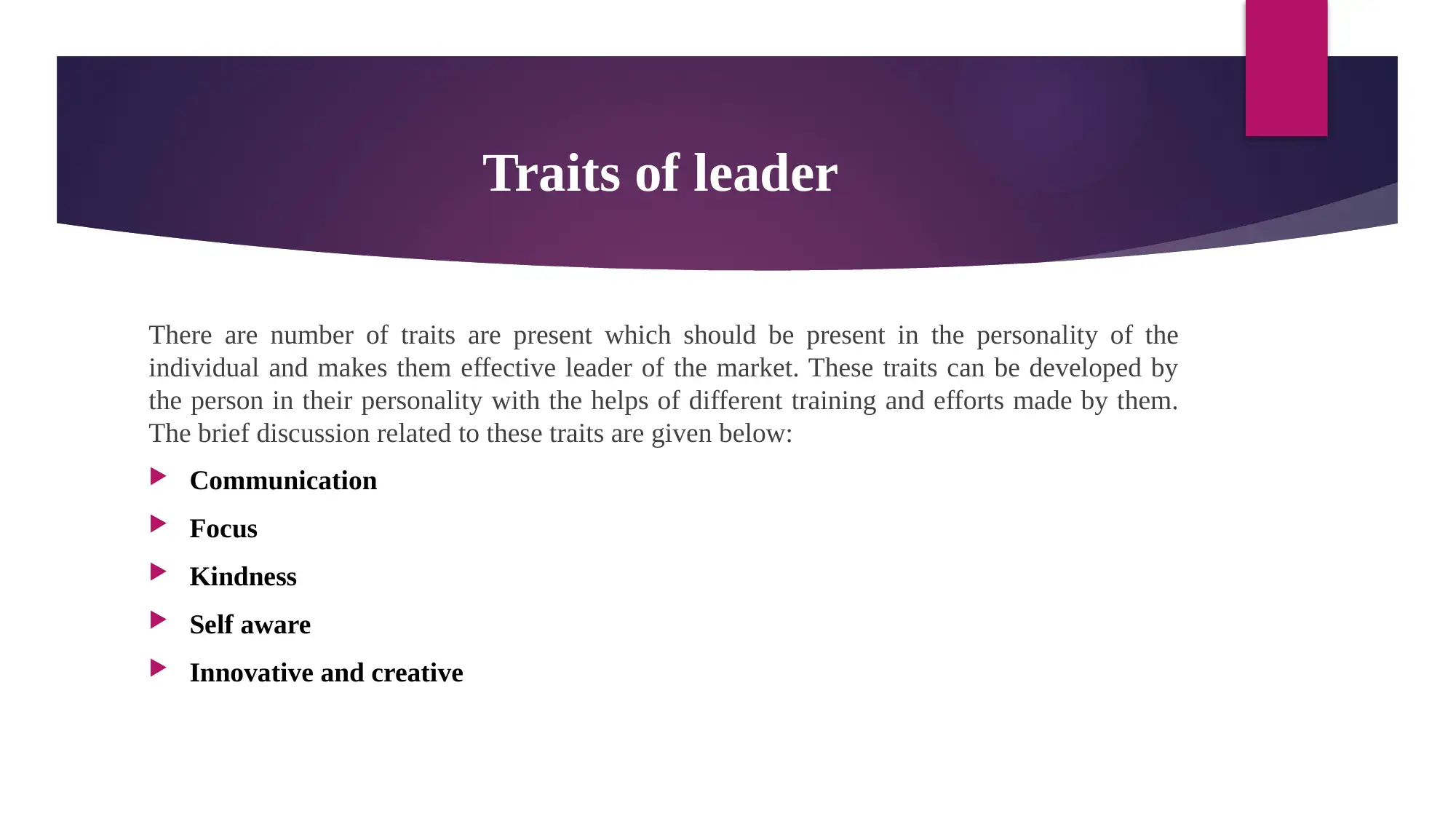
Traits of leader
There are number of traits are present which should be present in the personality of the
individual and makes them effective leader of the market. These traits can be developed by
the person in their personality with the helps of different training and efforts made by them.
The brief discussion related to these traits are given below:
Communication
Focus
Kindness
Self aware
Innovative and creative
There are number of traits are present which should be present in the personality of the
individual and makes them effective leader of the market. These traits can be developed by
the person in their personality with the helps of different training and efforts made by them.
The brief discussion related to these traits are given below:
Communication
Focus
Kindness
Self aware
Innovative and creative
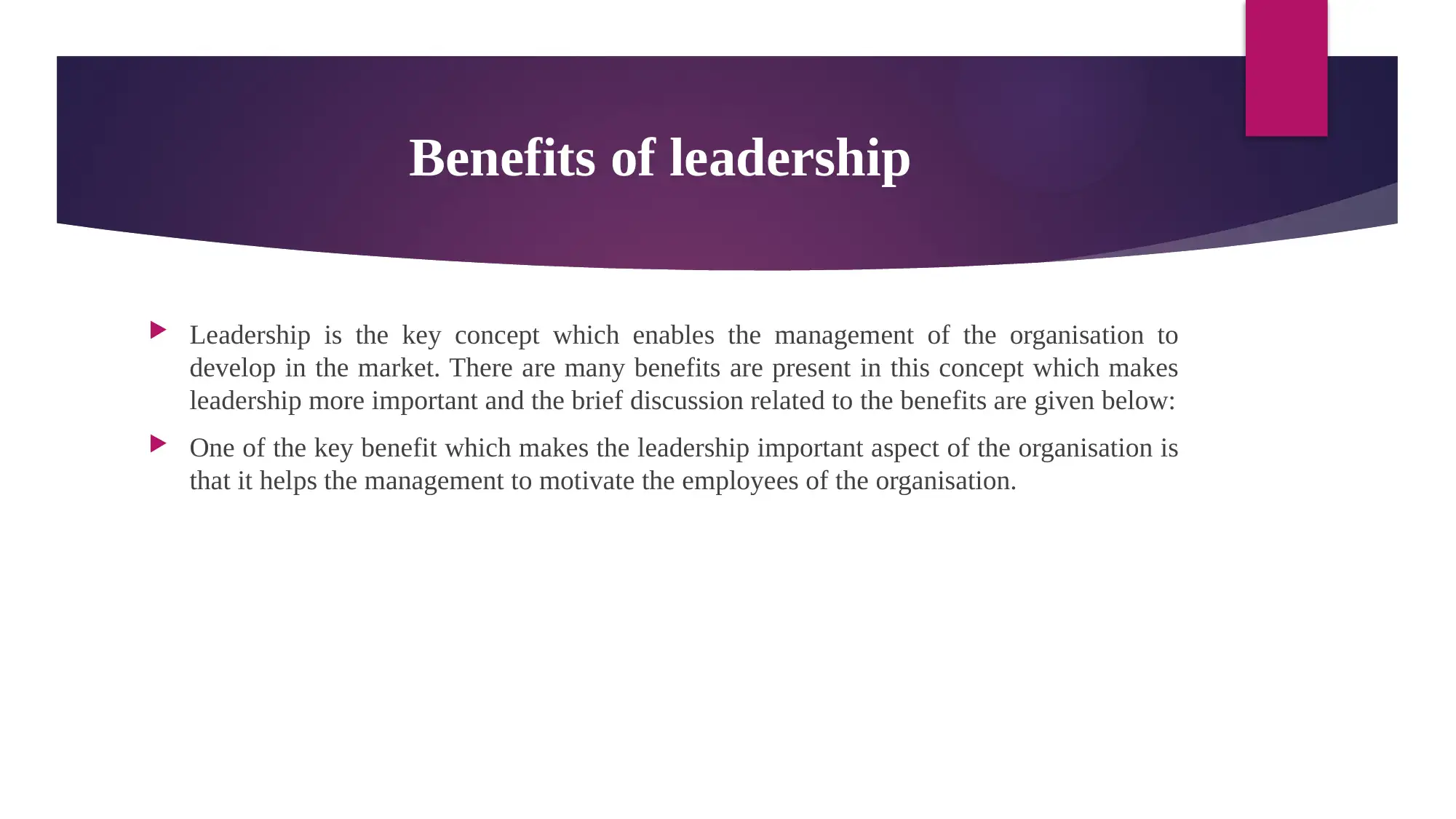
Benefits of leadership
Leadership is the key concept which enables the management of the organisation to
develop in the market. There are many benefits are present in this concept which makes
leadership more important and the brief discussion related to the benefits are given below:
One of the key benefit which makes the leadership important aspect of the organisation is
that it helps the management to motivate the employees of the organisation.
Leadership is the key concept which enables the management of the organisation to
develop in the market. There are many benefits are present in this concept which makes
leadership more important and the brief discussion related to the benefits are given below:
One of the key benefit which makes the leadership important aspect of the organisation is
that it helps the management to motivate the employees of the organisation.
⊘ This is a preview!⊘
Do you want full access?
Subscribe today to unlock all pages.

Trusted by 1+ million students worldwide
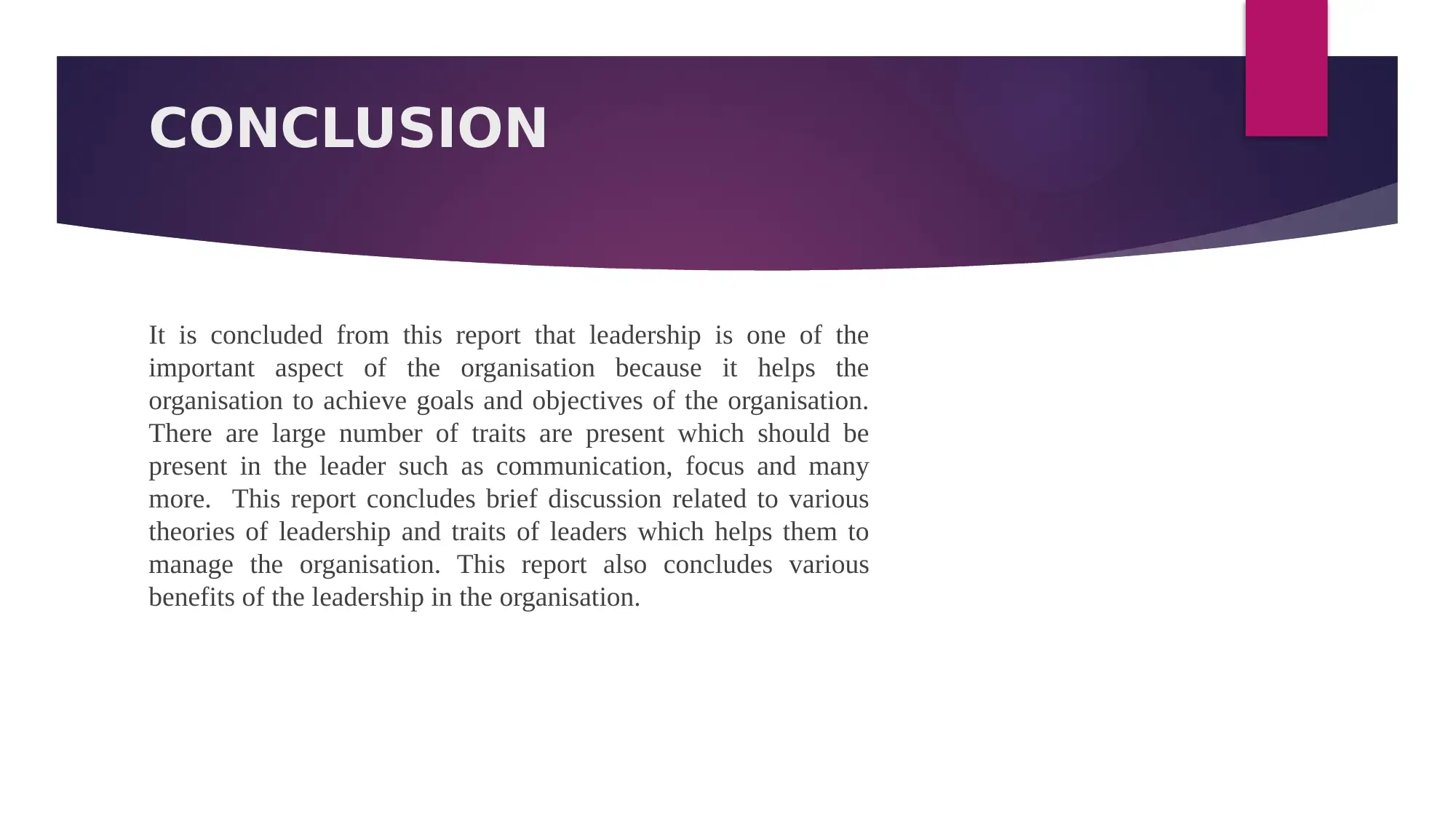
CONCLUSION
It is concluded from this report that leadership is one of the
important aspect of the organisation because it helps the
organisation to achieve goals and objectives of the organisation.
There are large number of traits are present which should be
present in the leader such as communication, focus and many
more. This report concludes brief discussion related to various
theories of leadership and traits of leaders which helps them to
manage the organisation. This report also concludes various
benefits of the leadership in the organisation.
It is concluded from this report that leadership is one of the
important aspect of the organisation because it helps the
organisation to achieve goals and objectives of the organisation.
There are large number of traits are present which should be
present in the leader such as communication, focus and many
more. This report concludes brief discussion related to various
theories of leadership and traits of leaders which helps them to
manage the organisation. This report also concludes various
benefits of the leadership in the organisation.
Paraphrase This Document
Need a fresh take? Get an instant paraphrase of this document with our AI Paraphraser
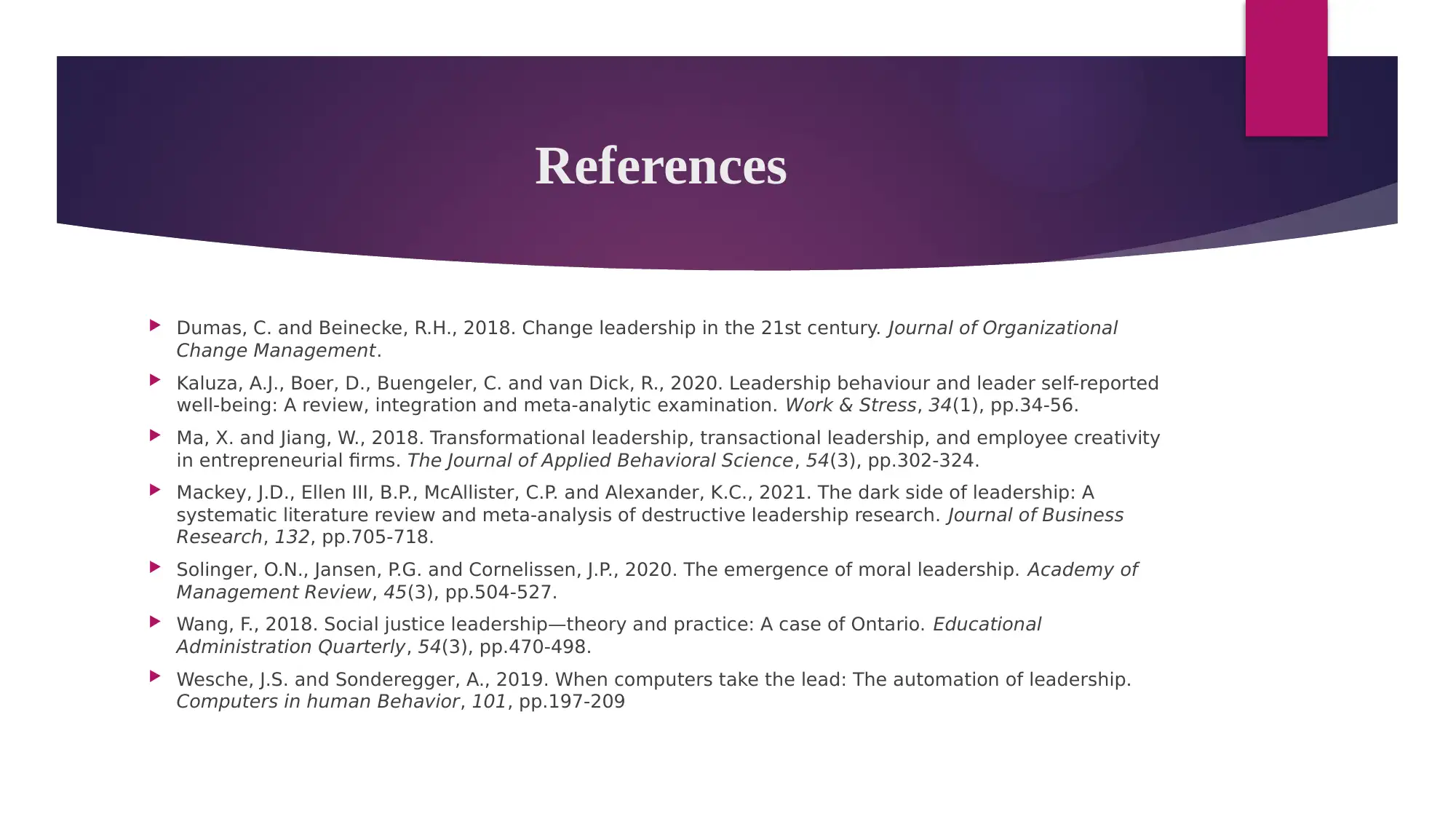
References
Dumas, C. and Beinecke, R.H., 2018. Change leadership in the 21st century. Journal of Organizational
Change Management.
Kaluza, A.J., Boer, D., Buengeler, C. and van Dick, R., 2020. Leadership behaviour and leader self-reported
well-being: A review, integration and meta-analytic examination. Work & Stress, 34(1), pp.34-56.
Ma, X. and Jiang, W., 2018. Transformational leadership, transactional leadership, and employee creativity
in entrepreneurial firms. The Journal of Applied Behavioral Science, 54(3), pp.302-324.
Mackey, J.D., Ellen III, B.P., McAllister, C.P. and Alexander, K.C., 2021. The dark side of leadership: A
systematic literature review and meta-analysis of destructive leadership research. Journal of Business
Research, 132, pp.705-718.
Solinger, O.N., Jansen, P.G. and Cornelissen, J.P., 2020. The emergence of moral leadership. Academy of
Management Review, 45(3), pp.504-527.
Wang, F., 2018. Social justice leadership—theory and practice: A case of Ontario. Educational
Administration Quarterly, 54(3), pp.470-498.
Wesche, J.S. and Sonderegger, A., 2019. When computers take the lead: The automation of leadership.
Computers in human Behavior, 101, pp.197-209
Dumas, C. and Beinecke, R.H., 2018. Change leadership in the 21st century. Journal of Organizational
Change Management.
Kaluza, A.J., Boer, D., Buengeler, C. and van Dick, R., 2020. Leadership behaviour and leader self-reported
well-being: A review, integration and meta-analytic examination. Work & Stress, 34(1), pp.34-56.
Ma, X. and Jiang, W., 2018. Transformational leadership, transactional leadership, and employee creativity
in entrepreneurial firms. The Journal of Applied Behavioral Science, 54(3), pp.302-324.
Mackey, J.D., Ellen III, B.P., McAllister, C.P. and Alexander, K.C., 2021. The dark side of leadership: A
systematic literature review and meta-analysis of destructive leadership research. Journal of Business
Research, 132, pp.705-718.
Solinger, O.N., Jansen, P.G. and Cornelissen, J.P., 2020. The emergence of moral leadership. Academy of
Management Review, 45(3), pp.504-527.
Wang, F., 2018. Social justice leadership—theory and practice: A case of Ontario. Educational
Administration Quarterly, 54(3), pp.470-498.
Wesche, J.S. and Sonderegger, A., 2019. When computers take the lead: The automation of leadership.
Computers in human Behavior, 101, pp.197-209
1 out of 11
Related Documents
Your All-in-One AI-Powered Toolkit for Academic Success.
+13062052269
info@desklib.com
Available 24*7 on WhatsApp / Email
![[object Object]](/_next/static/media/star-bottom.7253800d.svg)
Unlock your academic potential
Copyright © 2020–2026 A2Z Services. All Rights Reserved. Developed and managed by ZUCOL.





